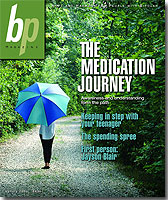Living Without Depression and Manic Depression
A Guide To Maintaining Mood Stability
![]()
Mary Ellen Copeland experienced episodes of severe mania and depression for most of her life. She interviewed numerous people to find out how people who experience psychiatric symptoms relieve these symptoms and get on with their lives.
David Roberts is the HealthyPlace.com moderator.
The people in blue are audience members.
David: Good Evening. I'm David Roberts, the moderator for tonight's conference. I want to welcome everyone to HealthyPlace.com. Our topic tonight is "Living Without Depression and Manic Depression: A Guide To Maintaining Mood Stability". Our guest is author and researcher, Mary Ellen Copeland. Besides writing about it, Mary Ellen experienced episodes of severe mania and depression for most of her life. She underwent numerous hospitalizations and medication trials that weren't helpful.
For the last ten years, or so, she's been studying how people who experience psychiatric symptoms, relieve these symptoms and get on with their lives. She's incorporated those self-help methods into her own life and tonight she's here to share with us the tools to maintaining mood stability. You can read more about Mary Ellen Copeland here.
Good Evening, Mary Ellen, and welcome to HealthyPlace.com. We appreciate you being our guest tonight. Before we get into some of the self-help methods, I mentioned that you tried psychiatric medications, antidepressants, along with the hospitalizations and therapy. Why, in your estimation, where those things not as effective or helpful as I'm sure you hoped they would be?
Mary Ellen Copeland: It's really nice to be here, David!
I think the therapies that were suggested by the doctors were not helpful because my life was so chaotic. I had no idea how to take care of myself. I sabotaged my own efforts at wellness.
David: Can you elaborate on that a bit?
Mary Ellen Copeland: Yes, I would be glad too. I didn't get enough rest. I ate lots of junk food. I didn't exercise. I had no idea how to relax. I didn't know how to say no to the requests of others. I sometimes abused substances. You can't get well when you live like that.
David: How many years have you suffered with mania and depression?
Mary Ellen Copeland: I think most of my life. I remember being very depressed for long periods of time when I was a child. I wish I had gotten help then. It wasn't until I was in my thirties that I finally reached out for help.
David: And why did it take so long?
Mary Ellen Copeland: I thought I could control it myself. But I was never able to. I didn't know how. That's why it has become so important to me to reach out to others and find out how they have helped themselves relieve these horrible symptoms.
David: I'm assuming, since you titled your book A Guide To Maintaining Mood Stability, that the goal here isn't really to cure depression and manic depression (bipolar disorder), but to really stabilize your moods so that you don't experience these huge mood swings. Is that correct?
Mary Ellen Copeland: That's correct. I work on managing my moods every day. But now I know a lot of ways to help myself feel better, so the moods no longer overwhelm me and my life. I still have symptoms, but they are much milder and of shorter duration. I used to spend months in the hospital, but now I have either a bad day, or several days, or sometimes just a bad afternoon.
David: That is a huge improvement.
I want to mention here that Mary Ellen is not a medical doctor, but she is a therapist, and now is involved primarily in educating others about mental health. The information she has to share with us tonight is based on interviews she did with others and her own experiences.
Please tell us, Mary Ellen, who you interviewed and what they were suffering with?
Mary Ellen Copeland: I have, in the last twelve years interviewed thousands of people from all over the country, who experience psychiatric symptoms or mental health problems.
David: And what have you found out in terms of self-help methods that worked?
Mary Ellen Copeland: I have found many things that are helpful to people. I have found so many things, that now I have ten books based on my findings. One of the first things I learned for myself, was that I, myself, had to do things that I enjoy. I had forgotten how to play and how to have a good time. So I began sewing, playing the piano, painting pictures, getting together with friends, and it made a huge difference in how I felt. I learned about the effects of diet, light and exercise on my moods and how to use them as ways to get my moods back under control. I could go on and on about this. There is so much to tell.
David: So one thing is, do things you enjoy doing. Put some joy in your life. What about diet?
Mary Ellen Copeland: I have found that junk food (food that is highly processed or loaded with sugar or fat) makes me feel much worse. If my diet focuses on healthy foods, like fresh vegetables, fruit, whole grain foods, some chicken and fish, I do much better. I have found that there are certain foods that make me feel worse including foods that I think should be OK. I have learned a lot through trial and error. Working with a good nutritionist and educating myself through self-help books and internet options. My diet is much different now than it was just a few years ago.
David: We will continue on with more of these self-help methods. But we have a lot of audience questions, Mary Ellen. So let's address some of those:
BreezeeBC: Why do I still have manic-depressive episodes, even though I am on medication?
Mary Ellen Copeland: Medications are never the whole answer. Take a look at your life. Are you spending time with people who treat you well? Do you eat healthy foods? Do you know how to relax? Do you take good care of yourself? Take a look at your lifestyle, and make changes where you need to.
dhill: I have been informed, by many sources, that ADD/ADHD, depression, etc. are caused by beta-carbolines created in our systems by the poisons in the prepared food that we eat. I have even been told that my son's anxiety and depression are not a psychological disorder, but results of these poisons. Can you comment on this, please?
Mary Ellen Copeland: I suggest you learn a lot more about this, by checking out websites and books that deal with healthy diet. Then decide what feels right to you. You may notice that your son feels worse when he eats certain foods. That will give you good clues about what is really going on.
scooby: What part of my depression is biochemical, and thus can yield to medication therapy. Furthermore, what part is going to yield to your type of therapy? Do I have to be in two ports to find out where my ship is going to arrive and when?
Mary Ellen Copeland: I think you should do everything you can to take good care of yourself. Then, if you still have symptoms that are hard for you to manage, you can use medications, if you choose to. It is important to remember that medications are just one tool to use to maintain mood stability. You will find many other things that are helpful to you as well.
David:One of the other tools you mentioned is light. How is that helpful? And what kind of light are you referring to?
Mary Ellen Copeland: Many people notice that they get more and more depressed when the days get shorter in the fall or when there is a series of cloudy days. This is referred to as seasonal affective disorder. They may also notice it when they spend a lot of time indoors. Sunlight helps relieve depression for many people. Getting outdoors, even on cloudy days, can help you feel better.
David: Here are some more questions:
buttercup: Are you saying medications are not always the way to go?
Mary Ellen Copeland: I am saying that there are choices to be made. I think it is very important not to expect medications to take care of problems in your life that need to be addressed in other ways, such as: taking good care of yourself and spending time with nice people. Many people find that when they have become very good at taking care of themselves, they need less medications, or no longer need them. But it takes time to learn the skills needed, to take really good care of yourself. It is important not to stop your medications but, first, to work on your wellness.
David: From the questions coming in, one of the things I'm finding is that many people, whether it's because their doctors have led them to believe this or not, think medications alone will be the cure. And they are disappointed, now that they've tried them, to find out they are not the cure-all.
Mary Ellen Copeland: I found out the same thing. Medications cannot fix an unhealthy lifestyle. And I found the side-effects of many of the medications, like extreme weight gain, lethargy, and lack of sex drive, to be intolerable.
specie55: Have you had any in-depth therapy to better understand the origins of your depression symptoms?
Mary Ellen Copeland: I have been in therapy with a wonderful woman therapist for many years. She helps me sort out current problems in my life. We have also worked together on issues related to trauma when I was a child. I think these traumatic events were a key factor in my mood instability. Current research is supporting the link between traumatic experiences and psychiatric symptoms.
David: I noticed that several of your books are geared towards women. Is that because you are a woman, or is it something else?
Mary Ellen Copeland: The book I wrote with Maxine Harris, Healing from Abuse. This is the only book I have written that is for women. I do not feel qualified to write a book on that topic for men. However, I do feel that many of the ideas in that book will be useful to men. It is based on a research project with women only.
David: You also mentioned exercise, as a self-help tool. And I know that some people may wince at that. How has that helped you, and what kind of exercise are you referring to?
Mary Ellen Copeland: Any kind of exercise is helpful. Movement of any sort, even walking up and down the stairs or doing simple stretching will help. Depression gets worse if you just sit around, and it gets much worse if you sleep too much. It may be very hard to exercise and you have to push yourself to do it. Do some kind of exercise you enjoy.
Joelle: What are the first steps to take, if one is at the place of a "no exercise, junk food, no relaxation experience" type lifestyle?
Mary Ellen Copeland: I was working with a group of people who developed a really good planning and action process for restoring wellness. It is called a Wellness Recovery Action Plan. I have written about it in several of my books and it has become popular across the country. I developed such a plan for myself and use it all the time. It has made a huge difference in my life.
David: From all the interviews you did, can someone achieve mood stability without a healthy diet, exercise, light, etc.?
Mary Ellen Copeland: I haven't met anyone yet.
photogirl624: My son has just been diagnosed Bipolar at age thirteen after being labeled and treated for ADHD his whole life. What are your thoughts on diagnosing children with Bipolar Disorder and the controversies that surround that?
Mary Ellen Copeland: I do not believe in diagnosing children. I believe it can be a stigma that keeps them from doing the things they want to do with their lives and it changes people's expectation of them. I believe we should work with our children, to help them learn how to relieve symptoms that are troubling to them and others, and leave labels out of it. I know this is often not a popular view.
jeckylhyde: I have been suffering with Bipolar Disorder all my life, but was diagnosed in 1986. After my second big crash, my therapist suggested that I buy your book The Depression Workbook. I was skeptical, but reluctantly picked it up. When I got to certain sections, I got even more depressed because I couldn't relate to so much of it. Especially the support sections. I have no family and only a few close friends scattered across the States. How do I build a support system without scaring off any new friends?
Mary Ellen Copeland: Building a support system is very important. You deserve to have people in your life who treat you well and support you through hard times. I have learned from others, that the best way to do this, is by joining a support group. Find one that feels right to you, and attend.
David: Here are a few audience comments on what's been said tonight:
recov10: I am not familiar with your new book, however, The Depression Workbook, has helped me for many years. It is a source right at my fingertips, and I thank you for helping me understand so much more about bipolar disorder, manic depression.
rick1: Mary, you know it's not about foods. It is really about tenseness.
Helen: Mary Ellen, I really appreciate your self-help books. I strongly believe that there are many things we can do to help manage our moods, and I think that often people with mental health disorders don't hear this, so they feel helpless and hopeless because of the disorder. So thanks for sharing what helps.
Reb: Both my mother and I have been diagnosed with Bipolar Disorder. Me, since 1971, and I agree with everything you mention. My mother is 88 now and is a convalescent. Her doctors do not keep her on medications for Bipolar and she is doing the best I ever seen.
Alley2: The Doctor has me on so much medication, but it doesn't really work. Instead, it just drugs me up. Furthermore, when I feel I need counseling, I don't get it, and I have to practically beg for it.
Sandra: I have been on Prozac for ten years, and find that I just as soon stay in my apartment rather than go out. Some days, not often, I need to get out but other days I get so down and want to stay in.
scooby: Isn't it wonderful to see people as warm, humorous, wacky rather than Axis I=Axis II=...I like you already :o)
David: Many of the things you referred to tonight, a healthy diet, exercise, even light, have to do with metabolism. Is that a key to maintaining mood stability ... speeding up your metabolism in a healthy way?
Mary Ellen Copeland: I think speeding up your metabolism in a healthy way, when you are starting to feel depressed, really works. I also have found techniques to slow me down when I am experiencing early warning signs of mania. It works both ways, and through consistent trial and error. Each person can find what works best for them in their life.
David: And we really haven't talked about mania (manic depression, bipolar disorder) too much yet. What self-help tools have you found to be effective for curtailing or containing the manic episodes?
Mary Ellen Copeland: The tool I use most to curtail mania is deep breathing relaxation exercises. When I realize I am starting to get really speeded up, I take a break and do one of these exercises. I have some of them on tape. Others, I have memorized. Sometimes I will spend a whole day involved in a very quiet activity with the radio, TV and music off, just to cool myself down and avoid mania. I used to have severe mania but have not had it in many years.
gremmy: Has it become more common for people to be put on more that one mood stabilizer? I feel like my options are running out. I'm a rapid cycler. My doctor just put me on another mood stabilizer and that makes two now.
Mary Ellen Copeland: Many people are on more than one medication. I am not an expert on medication. I am an expert on self-help. I have found that I can best manage my own moods by using many different self-help tools. I am allergic to most medications, so that has not been an option for me. And I manage my moods very well these days. I have been able to work, and do the things I want to do with my life. I have recently remarried and I am enjoying a wonderful relationship. This is something I couldn't do in the past.
dekam20: Do you believe that people with mental health problems are at high risk of abusing drugs and alcohol?
Mary Ellen Copeland: I believe they are. Mental health problems are very painful. Alcohol and other substances, will make you feel better at first. They relive the pain, but then, it is so easy to become dependent on them. They often cause depression and other severe side-effects. I believe using these substances are not worth it.
Joelle: Do you have suggestions for networking with other manic depressive people who have worked through lifestyle changes and no longer take medication (or take a lower dose than medically recommended)?
Mary Ellen Copeland: Being in touch with people through internet groups and groups in your community are very good ways. A few ways to connect with a group in your community is to call your county mental health department, a local psychiatric hospital, or look for therapists who work with depression and manic depression. They may be able to refer you to a group. Please call around.
PennyP: I am struggling with depression. Medications prescribed have no benefit. What can you suggest? I am upset with my therapist after 5+ years. She is recently writing my prescriptions. I don't trust her anymore, but I really feel lost without her. ANY ADVISE?
Mary Ellen Copeland: I suggest you develop for yourself a Wellness Recovery Action Plan. It involves:
- Discovering the things you need to do for yourself every day to keep yourself feeling well;
- Which triggers and early warning signs to watch for;
- What to do when these things come up, to help yourself feel better;
- How to know when things are getting really bad and what to do to help yourself then; and
- A crisis plan that tells others how they can help you, when your symptoms are very severe.
It is the best way I know to manage. And many people are doing this.
lithless: What sort of diet should a person with manic depression, bipolar disorder be on? Should caffeine intake be limited or totally taken out of the diet?
Mary Ellen Copeland: I think each person needs to find out for themselves, what foods make them feel better and what foods to avoid. For instance, I have found that dairy foods make me feel worse. But many people find them to be helpful. Most people say that sugar makes them feel much worse.
I suggest a diet that consists of at least five servings a day of vegetables and fruit, six or seven servings of whole grain foods (i.e. cereal, bread or pasta) along with a bit of chicken or fish. That's what I try to do, but it is hard sometimes. Also avoid caffeine as much as possible. It causes anxiety.
PoohBearHugz: What are your thought's on electric shock therapy (ECT)?
Mary Ellen Copeland: If you are considering electric shock therapy, learn all you can about it before you consent. I personally do not want it. I think there are many simple, safe, and effective ways to relieve symptoms without resorting to this treatment.
David: By the way, we are arranging a chat conference on ECT in October. We are going to have some people on, who have undergone ECT to talk about their experiences. One was not positive, the other is very happy with the result. So stay tuned for that.
scooby: If you could imagine a pie, and divide that pie into pieces, I wonder what size, and thus importance, you would place medication, exercise, diet, support groups, therapy as pieces? Is it okay to take one piece and the next in excess? Just playing with your concepts in my thinker-ticker.
Mary Ellen Copeland: I think this is the kind of thing you have to sort out for yourself. It is different for each of us. However, I personally believe in working with the less invasive kinds of remedies as much as possible. Figure out what works for you, and then do it.
David: Here's the link to the HealthyPlace.com Depression Community and the Bipolar Community. Click on the links to sign up for the mail list at the top of the pages.
For Mary Ellen's website at HealthyPlace.com click here or go to www.mentalhealthrecovery.com. You can view and purchase Mary Ellen Copeland's books about dealing with different aspects of depression and manic depression.
Mary Ellen, thank you for coming tonight and being our guest. It was very enlightening and informative.
Mary Ellen Copeland: It has been a pleasure to be here. Thanks for inviting me.
David: And thank you to everyone in the audience for coming and participating.
Disclaimer: That we are not recommending or endorsing any of the suggestions of our guest. In fact, we strongly encourage you to talk over any therapies, remedies or suggestions with your doctor BEFORE you implement them or make any changes in your treatment.
APA Reference
Tracy, N.
(2007, February 3). Living Without Depression and Manic Depression, HealthyPlace. Retrieved
on 2026, January 8 from https://www.healthyplace.com/bipolar-disorder/transcripts/living-without-depression-and-manic-depression








 A study led by a UCLA Neuropsychiatric Institute researcher challenges standard treatment guidelines for bipolar depression that recommend discontinuing antidepressants within the first six months after symptoms ease.
A study led by a UCLA Neuropsychiatric Institute researcher challenges standard treatment guidelines for bipolar depression that recommend discontinuing antidepressants within the first six months after symptoms ease. Peter Newman spent his youth in Birmingham, England and got what he calls "a quite nice telecom job in London." He had his first depressive episode at age 17 and was finally diagnosed with bipolar disorder at age 25. During a particularly acute manic episode, he applied to a Cambridge PhD program and was rather surprised to find himself accepted.
Peter Newman spent his youth in Birmingham, England and got what he calls "a quite nice telecom job in London." He had his first depressive episode at age 17 and was finally diagnosed with bipolar disorder at age 25. During a particularly acute manic episode, he applied to a Cambridge PhD program and was rather surprised to find himself accepted.